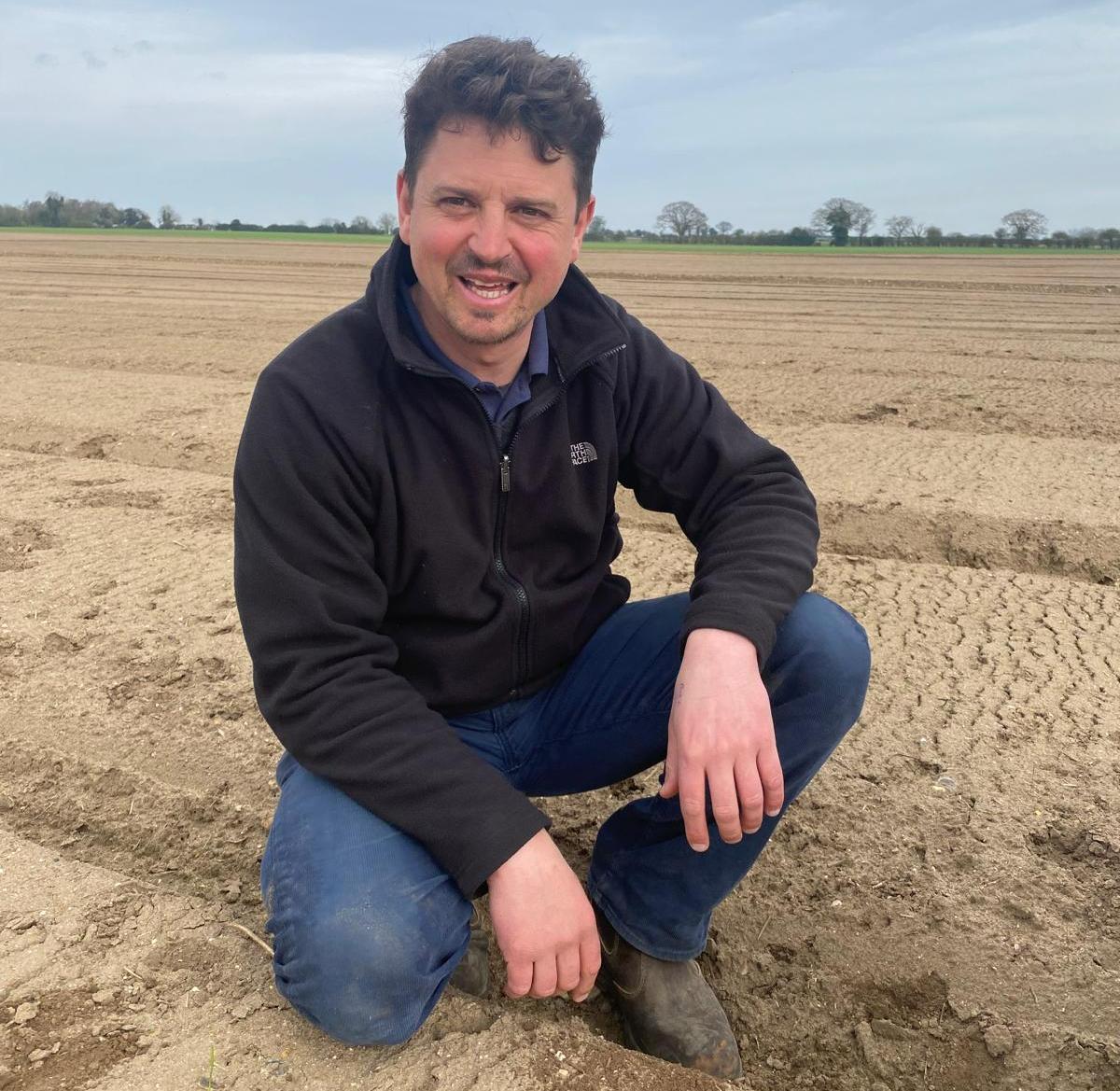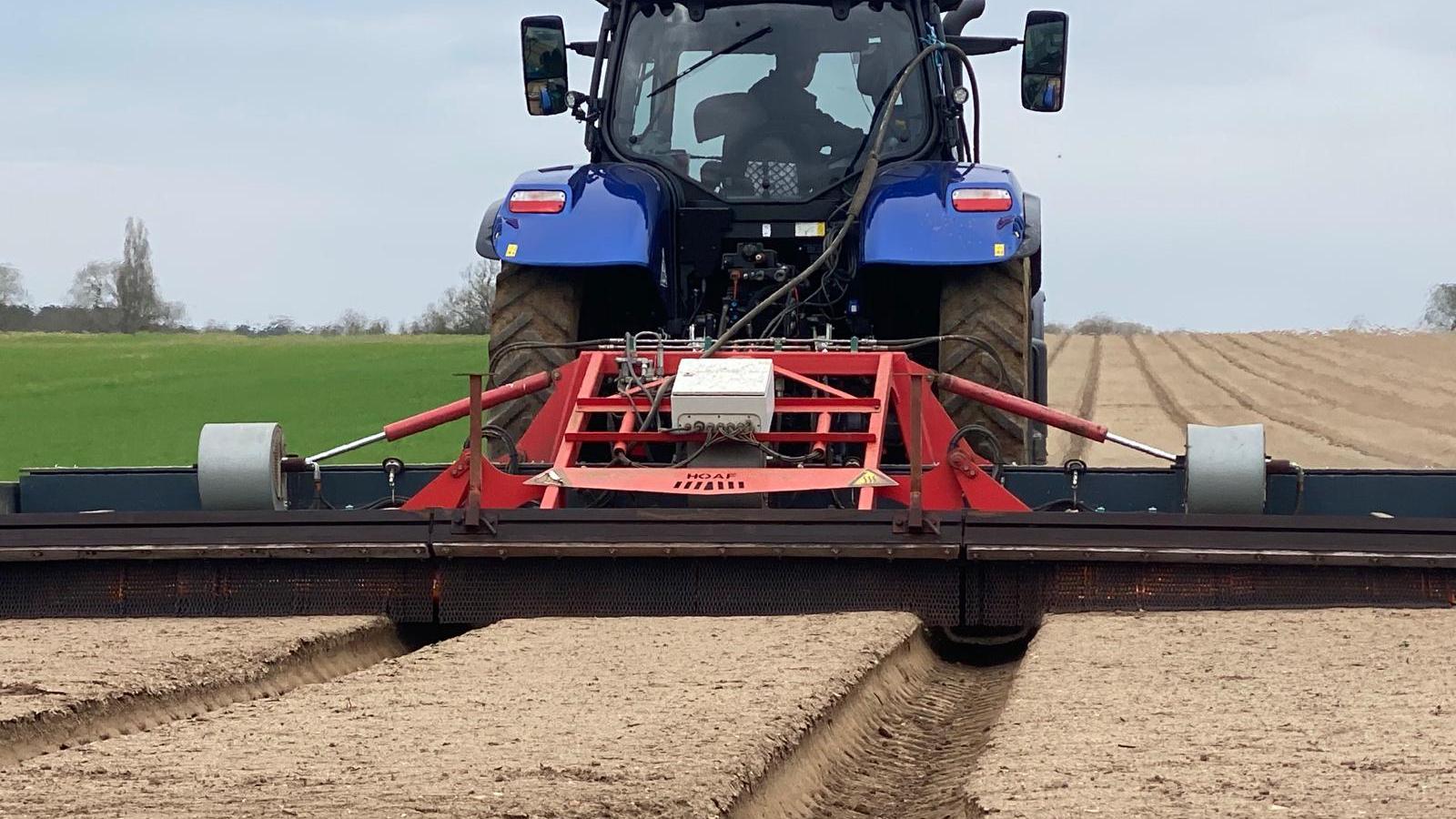Chris Negus
Breckland Organics

Setting the Scene
Perhaps an accidental Organic farmer Chris is now a keen advocate of organic systems. Organic conversion started in 2007 when multiple retailers his family carrot packing business was supplying started asking for organic carrots. Structural changes since then have reduced the farm size and Chris has simplified the business as he offers carrot management and agronomy to RB Organic carrot growers across East Anglia. All cereal operations are contracted out to neighbours meaning Chris now operates with 1 tractor and 1 self-employed staff member.
| Farm Name | Breckland Organics |
Cash Crops (Ha)
|
42 |
| Farm (Ha) | 70 Ha | Herd Size | na |
|
Owner/Tenant
|
35 Ha owned & 35 Ha rented
|
Soil Types
|
Sandy
|
|
Years Farming (Organic)
|
17 years
|
Annual Rainfall (mm)
|
600
|
|
Main enterprise
|
Carrots
|
Total HP |
Rotation Carrots are the key crop and are grown second in the rotation to allow the ley to have been fully destroyed. Weeding of carrots is a major cost and rogue clover in the crop would be expensive. Wheat appreciates the fertility of the first cereal position. Other vegetable, onions and brassicas have previously been grown. Catch green manures as used which has become easier now we don't have brassicas in the rotation.
| Red Clover Ley> | Red Clover Ley> | Cereal (Winter Wheat)> | Carrots> | Cereal (Spring Oats) > |
Agronomic Approach
The size of the farm was reduced in recent years and the system was simplified and focussed around carrot production. As with much veg production the approach may be considered quite an intensive one. The sandy soil has low organic matter levels and does not retain fertility and so fertility is imported. Before avian flu affected local flocks poultry manure was available from nearby poultry units but this supply has ceased and focus has turned to digestate which is available locally.
The soils are deficient in Manganese, Magnesium and Boron Omex 17.5 is applied for Manganese and Epsotop for Magnesium. The carrots receive Boron too. In addition Laws Hi N was applied to the wheat last year to give it a boost. Yields were 7.5t/Ha so it seemed to have worked. In addition an inch of irrigation water was applied to help through the dry Spring a luxury not available to many.
| Worst Weeds | Issues |
| Stinging Nettle | Once it is established and a true leaf formed it can only be weeded by hand |
Weed control is critical as hand weeding carrots is very expensive so the whole system is focussed on keeping weeds at bay. Nettles are the biggest weed problem as they are across the Brecks apparently which is seemingly counter intuitive as they are usually an indicator of high nutrition. Those seem at Breckland Organics are smaller and tougher then most so perhaps a local adaptation. Chris keeps his rotation flexible to "keep the weeds guessing" and so will make decisions based on the season and the state of the previous crop. The cereals are comb harrowed using a Treffler TS Precision Tined Harrow which Chris likes because the tine angle is adjustable on the move allowing for greater control and will be weeded several times until the crop is too large to allow. The intensity of tillage for carrot production must also impact the weed community and once beds are formed they will be weeded using a Hoaf Flame Weeder and once drilled the carrots are weeded using a comeb inter-row rotovator and a Garford Inter-row hoe. Finally hand weeding of the carrots will be undertaken but this is minimised as far as possible due to cost..
Chris is interested in the new Carbon Robotics precision laser weeding machine and knows of one being bough on a commercial farm in Holland but the price tag is currently off-putting at over £1 Million!
| Most "reliable" crop | carrots | Least "reliable" crop | carrots |
Key Agronomic Challenges
Biggest Agronomy Question: How early can I drill winter wheat? And if I can have a second the optimum drilling date for Spring Oats

Machinery
The decision was made to sell all the arable machinery and only retain the carrot equipment with other veg and arable equipment sold. The smaller farmed area and use of contractors made the additional machinery superfluous.
Best machinery Purchase: The Treffler tined weeder - "streets ahead of the Einbock they used to have" as it has far more control.
Worst machinery Purchase:
A leek harvester that was never actually used!
Total horsepower: 225 HP. With all of the cereal operations carried out by neighbouring contractors there is little need for a lot of power. The carrot lifter is trailed.
Worst moment in farming
When you have a crop failure. Or getting a notifiable nematode in an organic crop of carrots and having to wash them all in the field to stop the spread.
The biggest organic lesson learned?
Every year is different and you have to be flexible
Where do you see yourself and the farm in 10 years time?
Still farming, hopefully better than now and still organically.
What do you know now that you wish you'd known when you started farming organically?
You can't get every field perfect every time - you can't get every weed out, so do the best you can
Best moment in farming
Harvesting a really good crop that has good yield and quality
The best organic advice you've received?
Stop growing carrots 4 rows to a bed. Grow 3 rows to a bed to allow for more mechanical weeding and less hand weeding.
Best piece of advice you'd offer an organic farmer?
Constantly evolve and adapt your systems, learning from previous seasons and each other. Keep working together, especially as small organic growers
Did you have an epiphany moment? If so, what was it?
"Co-operation is the only way to make farming work. There are great benefits to working together."